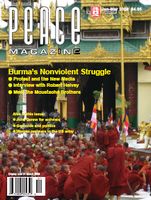
Peace Magazine Jan-Mar 2008, page 28. Some rights reserved.
Search for other articles by Mel Watkins here
Ed. by James L. Turk and Allan Manson Toronto: James Lorimer & Co. 2007
Franklin Delano Roosevelt famously told the American people during the Great Depression that they had nothing to fear but fear itself. Since 9/11 the message would be that there is no terror greater than the War on Terror. It penetrates even our universities.
It is hardly the first time that academic freedom has been under threat on this continent. This book is based on a conference sponsored by the Harry Crowe Foundation, an organization honoring the late Harry Crowe who was unjustly fired from United College (now the University of Winnipeg) in the late 1950s. In one of the Canadian academy's finest hours, sixteen members of the faculty of United College resigned in solidarity with him and the Canadian Association of University Teachers (CAUT) began its protection of academic freedom. The tradition continues: the book's co-editor James Turk is CAUT's Executive Director.
The most moving essays in the book hark back to the slimy days of McCarthyism in the 1950s US and remind us of the benefits to Canada from our willingness to take in American refugees. Lee Lorch actively opposed racism and became unemployable in his country. He came first to the University of Alberta -- yes, that's in Alberta, which doesn't always get the credit it deserves for its (relatively) progressive politics -- and then to York University where he is now professor emeritus of mathematics, a Fellow of the Royal Society of Canada, and a member of Pugwash Canada and Science for Peace. Canada is better than the US, Professor Lorch tells us, but he also reminds us of our imperfections, notably the University of Toronto's ill treatment of the physicist Leopold Infeld in the 1950s which led to his return to his native Poland and to his Canadian-born children being stripped of their Canadian citizenship.
Another distinguished mathematician, Chandler Davis, whose name graces the masthead of this magazine, paid the price of time in federal prison in Michigan in 1960 for his principled refusal to take the Fifth Amendment before the House Un-American Activities Committee. He came to teach at the University of Toronto and, in no time at all, was involved in organizing the 1965 teach-in against the war in Vietnam. He has remained active ever since.
Professors Lorch and Davis have shown the courage and the commitment to justice that one could wish every tenured academic were willing to exhibit.
The irrational fear and hysteria that gripped America in the fifties are back again in this decade. The book shows that Canada is, again, not as bad as the US or Australia. The case of Maher Arar, frequently mentioned in this book, is instructive. The good news is that there was a public inquiry that cleared Mr. Arar of any suspicion of being a terrorist, but the bad news is that Canadian officials were complicit in his being sent to Syria to be tortured and kept in a hole in the ground for a year, that the US refuses to admit of his innocence, and that Canadian authorities still "share" intelligence with American authorities.
We don't even know whether the Harper government would have seen fit to apologize to Arar if it had a majority, which it may yet stumble into. Nor is there evidence that the RCMP is able to do much right even if it wanted to. Meanwhile, the mad men running America have been peddling the paranoia that could let them bomb Iran.
So read this book and resolve to pay attention to what's going on. And for those of us who are at the universities: be thankful for the CAUT and the university-based legal scholars who are prominent contributors to this book.
Reviewed by Mel Watkins, an emeritus professor of political science and economics, University of Toronto.

Peace Magazine Jan-Mar 2008, page 28. Some rights reserved.
Search for other articles by Mel Watkins here